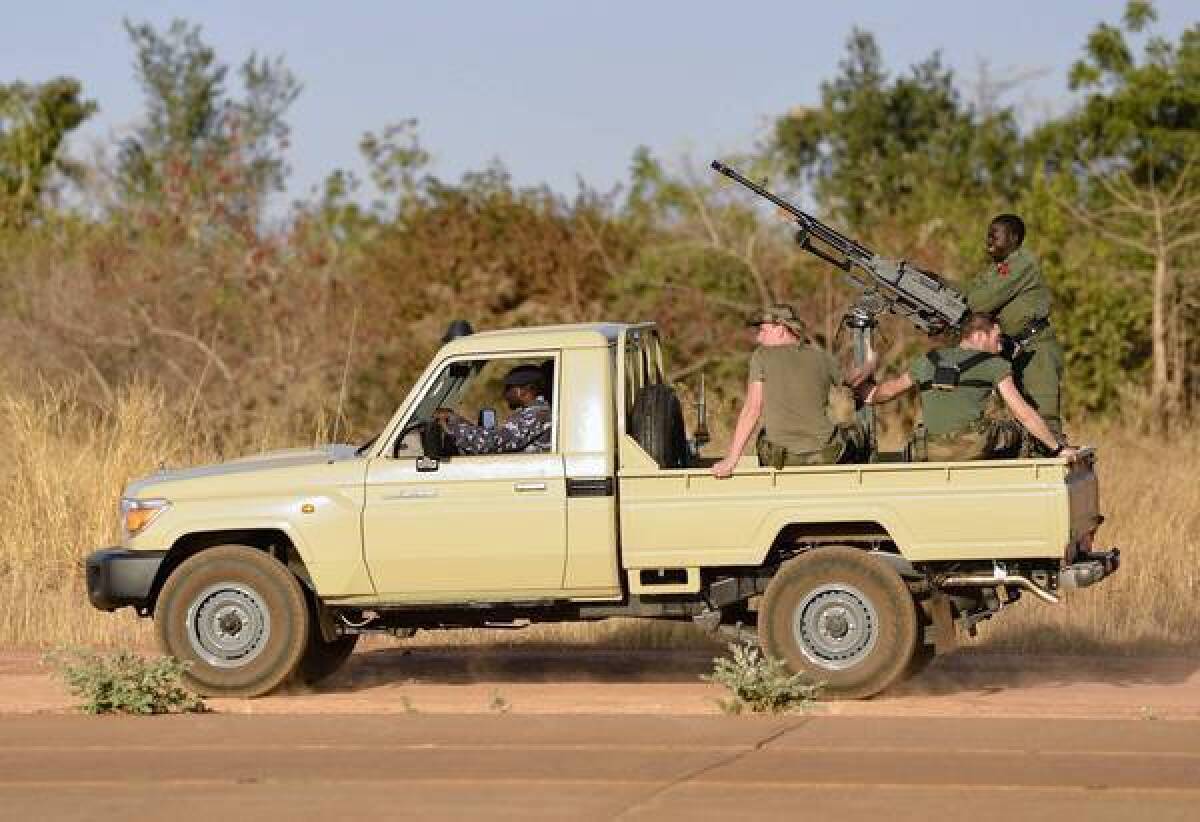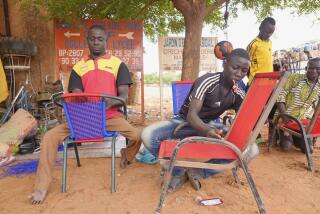U.S. moves to bolster French military campaign in Mali

- Share via
WASHINGTON — The Obama administration is preparing to ferry hundreds of additional French troops to the North African country of Mali, bolstering a rapidly evolving military campaign in the latest conflict with Al Qaeda affiliates.
U.S. officials said they also were making plans to send drones or other surveillance aircraft and provide help with aerial refueling of French fighter jets, which bombed columns of Al Qaeda-allied militants in northern Mali for a fourth straight day Monday.
The Pentagon’s moves reflect growing concern in Washington about rebel advances, and a decision by the Obama administration to back France’s operation after months of inaction. French officials said they had halted the rebels’ advance on Bamako, the capital, but insurgents later overran Malian forces in a town about 200 miles northeast of the capital.
Defense Secretary Leon E. Panetta, speaking to reporters during a trip to Europe, said the U.S. was already providing the French with intelligence help, citing “a responsibility to go after Al Qaeda wherever they are.” Defense officials said small numbers of U.S. troops might be sent to Mali and surrounding countries but that they would be limited to a support role.
“We have promised [France] that we will ... provide whatever assistance we can to try to help them,” Panetta said.
As the Obama administration winds down the United States’ long, costly war in Afghanistan, the focus of Western governments’ terrorism concerns has shifted to places such as Yemen, Somalia and northern Nigeria. Once-stable Mali joined the list after Islamist rebels seized the northern half of the country after a military coup in March. According to U.S. officials, the militants set up training camps and increased coordination with militant groups elsewhere in Africa.
The militants imposed harsh Islamic law, including forced amputations and summary executions.
The rebels include hundreds of fighters from Al Qaeda’s North African affiliate, Al Qaeda in the Islamic Maghreb, which U.S. officials have described as the terrorist network’s best-financed branch. Flush with cash from kidnapping and smuggling operations, the fighters gained large stocks of military equipment after the 2011 fall of Moammar Kadafi in Libya. Weapons from Kadafi’s regime flowed across the lawless Sahara into Mali.
U.S. officials say the Al Qaeda offshoot has between 800 and 1,200 fighters and that an unknown number also have joined in recent months from other African nations and Europe.
“They’ve increased in numbers because they’re able to operate a little more openly,” one U.S. defense official said before the French campaign began. “A lot of folks have seen the success they’ve had, and that draws in people from the region as well as foreigners who’ve come in from outside the region.”
France, the former colonial power in Mali, has a large North African immigrant population and has long feared that Islamists could use their base in Mali to plot attacks on French soil. Eight French hostages reportedly are being held by Islamists in northern Mali.
U.S. officials until recently didn’t regard the threat with great urgency, but the rebel advance last week appeared to force France’s hand — and heightened American concern. According to local news reports, one group of fighters attacked the town of Konna and moved toward government-controlled Mopti while a second group advanced to the west, showing a level of coordination that analysts hadn’t seen before.
“Until a week ago, I and others were telling people we don’t really think that there’s much of a threat here, because these [militants] have very parochial interests and we don’t think they’ve got the military capability,” said Michael Shurkin, a former CIA analyst who worked on Mali and is now an expert at the Rand Corp. think tank.
“What France saw this last week just scared it. It saw real capability, audacity and capacity,” he said.
French President Francois Hollande swiftly sent 550 troops to Mali, mainly to Bamako to secure the airport and, if necessary, evacuate the roughly 6,000 French citizens living there, officials said. France has asked the Pentagon for help in quickly moving another 500 to 600 troops and their equipment into the country, a U.S. defense official said.
U.S. military planners were devising options for using Air Force cargo planes to move the forces from France to staging areas outside Mali, possibly including the neighboring countries of Niger and Burkina Faso, the official said.
“We’re going to do it,” the official said. “We just don’t know what platforms yet,” referring to the types of aircraft.
The United States for several years conducted training operations with Mali’s armed forces but was legally required to suspend all assistance to the Malian government after the March coup. A U.S. official said that restriction was delaying assistance to the French operation, but Obama administration lawyers were looking at ways around the prohibition.
Last month the United Nations signed off on a West African-led plan to send 3,300 regional troops to help Malian forces retake the north. France is putting pressure on the West African bloc to speed the deployment of its soldiers.
French Prime Minister Jean-Marc Ayrault said the campaign had three objectives: to stop the rebel advance, preserve Mali’s territorial integrity and prepare for the arrival of African troops.
“Our priority now is to accelerate the deployment of the African intervention force,” Ayrault said.
But there were signs Monday that the French operation could take longer than planners hoped. Rebels launched a counterattack in the government-held town of Diabaly, to the west of the heaviest bombardments, driving the Malian army from the area.
“The forces of the terrorist groups are exactly what we expected,” said French Defense Minister Jean-Yves Le Drian, adding that the focus of the bombing campaign would shift to the west.
“They are heavily armed. They are very determined. They are very well-organized. We knew this,” he said.
The African intervention has been in the works for months, and some U.S. officials said the Islamist rebels had been planning for a foreign intervention. A spokesman for one of the rebel groups, the homegrown Movement for Unity and Jihad in West Africa, vowed a long fight, saying, “France has opened the gates of hell for all the French.”
Late Monday, U.S. officials said that France appeared to have stopped the main rebel advance for now. The Islamists’ harsh treatment of civilians may also be complicating their efforts to quickly seize new ground.
“Although extremists in northern Mali are well-armed and resilient, they’re facing their first real test,” a U.S. official said.
Special correspondent Kim Willsher in Paris contributed to this report.
More to Read
Sign up for Essential California
The most important California stories and recommendations in your inbox every morning.
You may occasionally receive promotional content from the Los Angeles Times.













